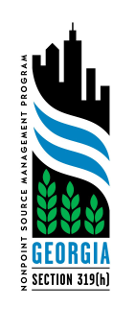Section 319(h) Georgia's Nonpoint Source Implementation Grant
UPDATED February 2024:
FY2024 Grant Application Period is OPEN
- Application Deadline: APRIL 30, 2024
- Register for the Online Application Workshop to be held March 1, 2024 (10:00-11:30 AM). A recording of the workshop will be available after that date.
- Submit Applications Online through the 319(h) Grant Administration Portal (GAP).
The Georgia Environmental Protection Division (GAEPD) anticipates receiving a FY2024 Section 319(h) grant to prevent or abate nonpoint source pollution in support of
Georgia’s
Statewide Nonpoint Source Management Plan
. Using a competitive process, GAEPD will award grant funds to eligible projects that propose to address nonpoint sources of pollution by identifying and implementing the activities best suited to address those sources resulting in measurable water quality improvements to impaired waters throughout the State.
The grant requires a cost-share ratio of 60% Federal dollars (maximum) and 40% non-federal match (minimum) toward the total project cost. There are no maximum or minimum Federal award amounts for any individual project. Proposed project schedules should be completed within three years.

ELIGIBLE APPLICANTS: Public entities in Georgia are eligible applicants, including: City and county governments with Qualified Local Government Status as defined in paragraph 18 of subsection (a) of O.C.G.A. 50-8-2*, State agencies, Local, regional, or State authorities operating jurisdictional services and/or delivery programs, Regional Commissions, Resource Conservation and Development Councils, Local and regional school systems, and State colleges and universities
MINIMUM REQUIREMENTS FOR FUNDING: All projects must address nonpoint sources of pollution to improve water quality. Projects must meet three minimum requirements:
- Implement an existing watershed-based plan that meets USEPA’s Nine Elements of Watershed Planning or implement a Summary of Nine Elements.
- Locate the project in a watershed or drainage area equal in size to a 10-digit Hydrologic Unit Code (HUC-10) or smaller.
- Commit to a minimum 40% non-Federal Match that can be accomplished through local funds, in-kind services, or other non-Federal sources.
ELIGIBLE PROJECTS: Grant applications must specify the nonpoint sources of pollution and identify the activities best suited to address those sources, such as the following: green infrastructure/low impact development projects; watershed hydrology restoration; urban stormwater controls not included in NPDES permits; agricultural BMPs; education and training; and lake/pond dredging as long as ALL contributing sediment sources have been corrected.
APPLICATION DOCUMENTS:
- Grant Application - 319(h) Grant Administration Portal [January 2024]
- Grant Project Schedule -
Section 319(h) FY2024 Grant Project Schedule (EXCEL Format) [Revised January 2024]: This document is a required component of the FY2024 Section 319(h) Grant application and must be uploaded into the 319(h) Grant Administration Portal. This schedule will be used to track the completion of tasks, reporting requirements and the expenditure of funds.
- Grant Guidelines -
Section 319(h) FY2024 Grant Guidelines [Revised January 2024]
ADDITIONAL APPLICATION RESOURCES:
-
Georgia’s Statewide Nonpoint Source Management Plan 2019
- Georgia's Watershed Based Plans Addressing Nonpoint Source Pollution - List of Nine Element Watershed Based Plans funded by GAEPD
- Georgia’s 2022 Section 305(b)/303(d) List of Waters - Scroll down past Georgia 2022 305(b)/303(d) List Documents to access 305(b)/303(d) Integrated Report for listings of 2022 Rivers/Streams, 2022 Coastal Streams, and other waterbodies.
- USEPA's Resources for Watershed Planning Website - Contains information about the "Handbook for Developing Watershed Plans to Restore and Protect Our Waters", the "Quick Guide to Developing Watershed Plans to Restore and Protect Our Waters", and the Watershed Plan Builder application to build a plan framework. Note: Datasets for Georgia may not be up-to-date nor appropriate for HUC10/HUC12 level watersheds.
FY2024 319(h) GRANT TIMELINE
- January 31, 2024: GAEPD opens the 319(h) Grant Administration Portal
- March 1, 2024 (10:00 - 11:30am EST) Register for the Online Application Workshop
- April 30, 2024: Deadline to submit applications via the 319(h) Grant Administration Portal
- Late Spring 2024: Scoring Committee reviews and scores all applications
- Summer 2024: GAEPD notifies applicants of grant award
Grants Unit Manager, Joy Hinkle
- Fall 2024: GAEPD and grant recipients finalize project scope of work and execute contracts